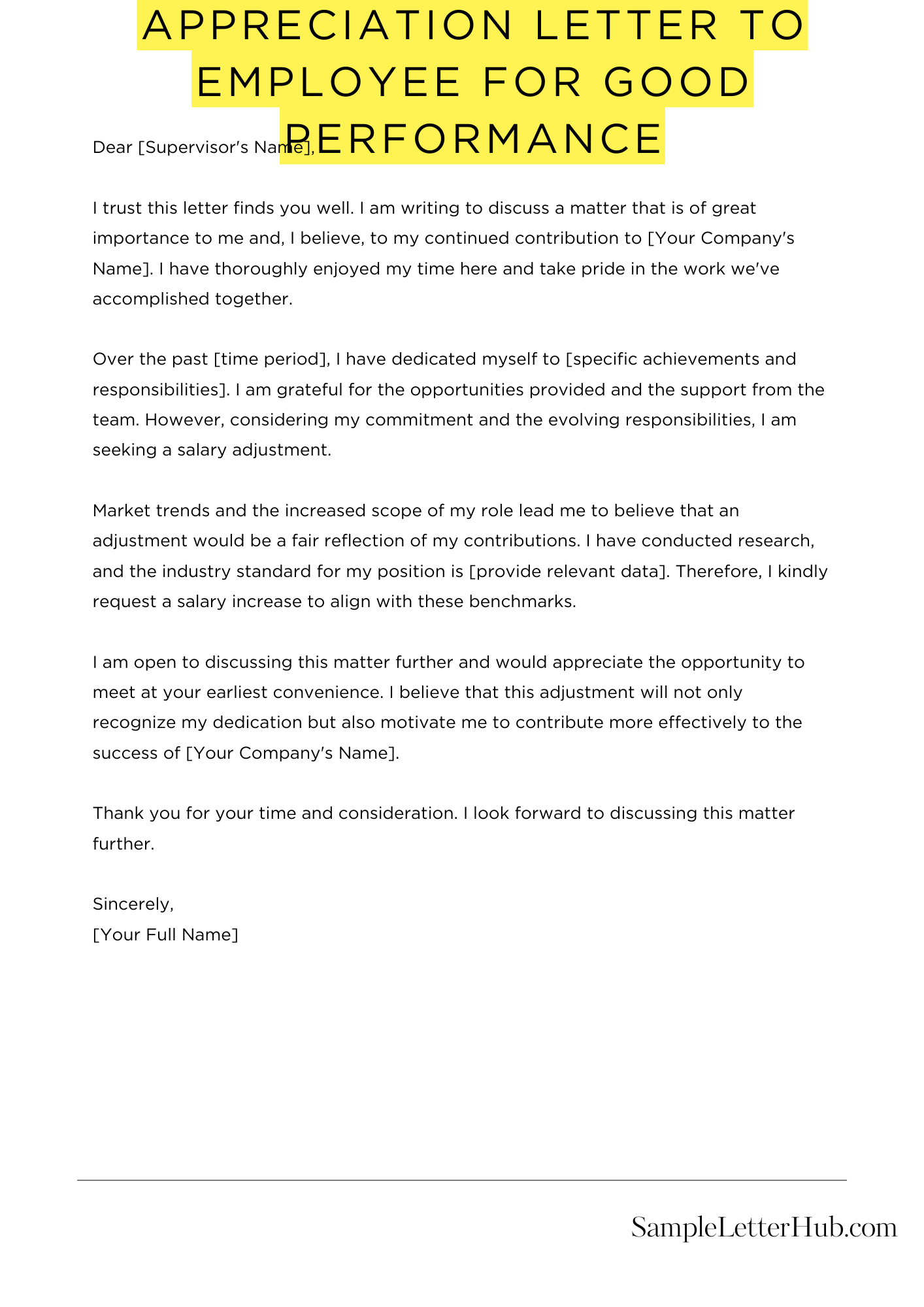An appreciation letter to an employee for good performance is a formal letter written by a manager or supervisor to express gratitude and recognition for an employee’s exceptional work and contributions. It serves to acknowledge and appreciate the employee’s efforts, boost their morale, and motivate them to continue performing at a high level.
In this article, we will provide you with a collection of templates, examples, and samples of appreciation letters to employees for good performance. These pre-written letters are designed to make it easy for you to customize and use as a starting point for your own letters. They cover various scenarios and achievements, ensuring that you can find the right words to express your appreciation and recognition.
By using these templates and examples, you can save time and effort while ensuring that your appreciation letters are professional, effective, and meaningful. They will help you convey your gratitude to your employees in a way that inspires and motivates them to continue their excellent work.
Appreciation Letter for Exceptional Performance
Dear [Employee Name],
I am writing to express my sincere gratitude for your outstanding performance in your role as [Employee’s Position]. Your dedication, hard work, and unwavering commitment have been invaluable to our team.
Over the past [Number] months, you have consistently exceeded expectations in all aspects of your responsibilities. Your attention to detail, proactive approach, and willingness to go the extra mile have made a significant impact on our company’s success.
Specifically, I would like to commend you for your exceptional contributions in the following areas:
* [List of specific accomplishments]
Your positive attitude and willingness to collaborate with colleagues have fostered a productive and supportive work environment. Your ability to work independently and as part of a team has been instrumental in achieving our goals.
Your commitment to professional development is commendable. You have actively sought opportunities to enhance your skills and knowledge, which has benefited both you and the company.
Thank you again for your exceptional performance. Your contributions are greatly valued, and we are fortunate to have you as a member of our team.
We look forward to your continued success and growth within our organization.
Sincerely,
[Your Name]

How to Write an Appreciation Letter to an Employee for Good Performance
When an employee goes above and beyond, it’s important to show your appreciation. A well-written appreciation letter can motivate employees, boost morale, and strengthen the bond between you and your team.
1. Start with a Strong Opening
The first sentence of your letter should grab the employee’s attention and make them feel valued. For example, you could say, “I am writing to express my sincere gratitude for your outstanding performance over the past year.”
2. Be Specific
Don’t just say “good job.” Take the time to list the specific accomplishments that you’re appreciating. For example, you could say, “I was particularly impressed with your work on the recent project. Your attention to detail and dedication to excellence were evident in every aspect of your work.”
3. Be Sincere
Your appreciation letter should be genuine and heartfelt. Take the time to write a personal and meaningful message. Avoid using generic phrases or clichés.
4. Offer Specific Praise
In addition to listing the employee’s accomplishments, take the time to praise their specific qualities. For example, you could say, “I appreciate your positive attitude, your willingness to help others, and your commitment to our team.”
5. Explain the Impact of Their Work
Help the employee understand how their work has benefited the company or team. For example, you could say, “Your work on the recent project has helped us to increase our sales by 10%. Your contributions are making a real difference.”
6. End with a Strong Closing
The last sentence of your letter should leave the employee feeling motivated and appreciated. For example, you could say, “I am confident that you will continue to excel in your role and make valuable contributions to our team.”
7. Proofread Carefully
Before you send your appreciation letter, take the time to proofread it carefully. Make sure there are no errors in grammar or spelling. A well-written letter will show the employee that you care about their work and that you appreciate their contributions.
FAQs about Appreciation Letter To Employee For Good Performance
What is the purpose of an appreciation letter to an employee for good performance?
An appreciation letter is a formal way to recognize and thank an employee for their hard work, dedication, and contributions to the company. It is a way to show that their efforts are valued and appreciated.
What are the key elements of an appreciation letter?
An appreciation letter should include the following key elements:
- A clear and concise statement of appreciation
- Specific examples of the employee’s good performance
- A statement of how the employee’s performance has benefited the company
- A personal touch, such as a handwritten note or a personal anecdote
What are the benefits of giving an appreciation letter to an employee?
There are many benefits to giving an appreciation letter to an employee, including:
- Increased employee morale
- Improved employee performance
- Reduced employee turnover
- Strengthened employer-employee relationships
How often should you give an appreciation letter to an employee?
The frequency with which you give an appreciation letter to an employee will vary depending on the company’s culture and the employee’s performance. However, it is generally recommended to give an appreciation letter at least once a year, and more often for exceptional performance.
What are some tips for writing an effective appreciation letter?
Here are some tips for writing an effective appreciation letter:
- Be sincere and specific
- Use clear and concise language
- Proofread your letter carefully before sending it
- Consider giving the letter in person or in a private setting

